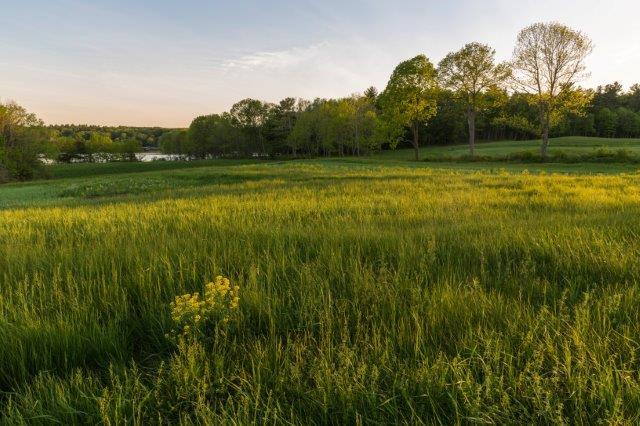DURHAM — The Society for the Protection of N.H. Forests bought an additional 36-acre conservation easement from the landowners of Emery Farm.
Emery Farm has been a part of the fabric of the Seacoast for generations and has been locally run and operated by the same family for more than 350 years.
It is a favorite spot for local vegetables and fruit, pumpkins and Christmas trees, and a farm store boasts coffee and local goods from surrounding artists and makers. The Forest Society bought the additional conservation easement from David Hills and Catherine McLaughlin-Hills, permanently protecting the agricultural land and its frontage along Oyster River.
The Hills sold the conservation easement at an undisclosed price significantly below market value. The conserved tract of land includes the fields and pasture on the south side of Route 4 across from the Emery Farm store and next to Wagon Hill Farm. The conservation easement helps protect 1,700 feet of scenic frontage on Route 4 and 2,500 feet of tidal frontage on the Oyster River and Smith Creek.
This latest conservation easement is the third and final phase of the effort to protect the historic farm. In 2003, the family conserved a 129-acre woodlot that is now owned and managed by the Forest Society. In 2006, the Hills conserved 59 acres north of Route 4 (the agricultural land surrounding the Emery Farm store) with a separate Forest Society held conservation easement. The Great Bay Resource Protection Partnership, The Nature Conservancy and the Forest Society have partnered with the Hills family on each of these transactions.
“This beautiful conservation easement on the tidal Oyster River and Smith Creek conserves a very important piece of land from development and all of the benefits that go along with that,” said Jane Difley, Forest Society president/forester. “The conservation of this property is extremely important to the Seacoast community, to a way of life, to the production of local food, to the long history of the land, to water quality, to wildlife and to the Hills family.”
David Hills is the 10th generation of his family on the farm. Hills will still own the farm and be able to manage it for agriculture, forestry, recreation and wildlife. He has leased the land to Bill and Brad Towle for the last 27 years. This relationship will continue, along with leasing the farm store to Holly Philbrick Craig, who started leasing from Hills last year.
“Our family is happy to see this easement come to completion,” Hills said. “We have always tried to make the right decision for the land, the environment, our children and future generations. We are humbled with the opportunity to keep land in its present state. This is the land’s natural state, and honoring the land has been respected by native cultures for many generations before our family settled here. Protecting Emery Farm from development and allowing it to continue its long history of farming, timber harvesting and being a gathering place for locals is the right decision.”
The location of the parcel along the tidal Oyster River and Smith Creek where they merge before flowing into Great Bay made its protection a high priority for protection of the Great Bay estuary. The easement will also help keep the land in agriculture, preserving the vital connection between the community and local food.
“Historically, Durham residents have been strong supporters for land conservation efforts,” said Robert Sullivan, chairman of the Durham Conservation Commission. “Once again, Durham’s current residents have stepped up to help ensure the Great Bay and environs will remain a healthy and productive resource.”
The Nature Conservancy of New Hampshire and the Great Bay Resource Protection Partnership were instrumental partners with the Forest Society in securing the conservation easement and raising project funding.
The easement was purchased with significant financial contributions from partners, including the USDA Natural Resources Conservation Service, New Hampshire Land and Community Heritage Investment Program, town of Durham, Thomas W. Haas Fund of New Hampshire Charitable Foundation, Lewis Family Foundation, Great Bay Resource Protection Partnership, Great Bay 2020 and more than 50 contributions from Forest Society members.
The Forest Society is a private, nonprofit land trust and forestry organization established in 1901. It holds more than 750 conservation easements statewide permanently protecting more than 100,000 acres of New Hampshire’s landscapes. It also owns 171 forest reservations of more than 50,000 acres in 95 New Hampshire communities.

